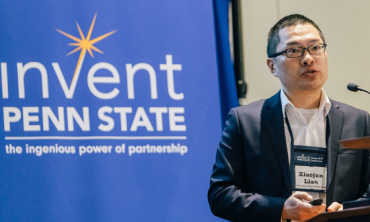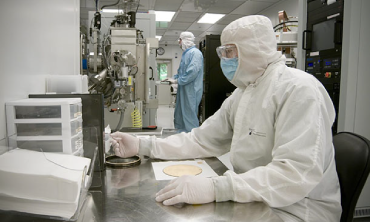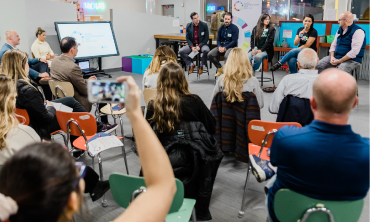Materials Research
Penn State knows materials science. We are consistently ranked the top university in the country for materials science research expenditures according to the National Science Foundation. Penn State has created a culture of strong collaborations across disciplines and has opened up traditional silos of knowledge to the stimulus of other viewpoints and new ideas.

Interdisciplinary Leader in Materials Research
Penn State is consistently ranked number 1 for Materials Science research expenditures and Penn State’s Materials Research Institute is the gateway to world-class materials science and engineering at the University. The Materials Research Institute includes more than 300 faculty members, 800 graduate students, and 200 post-doctoral researchers across twenty-five departments in five colleges. From traditional fields like ceramic science to newer fields like nanotechnology, our interdisciplinary researchers are helping to address the complex problems our country faces in health, the environment, energy, and national security.
- Biomaterials: The study of biomaterials draws upon many scientific disciplines including but not limited to chemistry, biology, physics, and medicine to integrate the physical properties of materials with living structures. Research in biomaterials has led to advanced joint replacements, improved heart valves, dental implants, artificial tissues, dynamic prosthetics, diagnostic tools, and drug delivery devices to name just a few examples. Advances in nanotechnology, polymers, ceramics, and composite materials have greatly increased the potential applications for the field. Examples of biomaterials research at Penn State include work on the Left Ventricular Assist Device, an advanced heart pump; NanoJackets, an innovative drug delivery device that infiltrates tumors to deliver cancer therapies; as well as exploration into advanced regenerative biomaterials & therapeutics.
- 2D Materials and Coatings: 2-Dimensional materials are a class of nanomaterials defined by their property of being merely one or two atoms thick. Graphene is at this time the material most commonly associated with 2-D materials. 2-D materials possess remarkable properties in their ability to be exceptionally strong, lightweight, flexible, and excellent conductors of heat and electricity. Graphene for example is one million times thinner than paper, nearly transparent, and believed to be the strongest material in the world. For the first time in history, the Penn State researchers grew a single atomic layer of tungsten diselenide on a one- atom-thick substrate of graphene with pristine interfaces between the two layers.
- Additive Manufacturing: Additive manufacturing, also known as 3-D printing, refers to a process in which objects are produced layer by layer from a digital file or model. The technology has the potential to find new applications for virtually every material, as well as the potential to create new alloys and composites not previously possible. The uses for this technology and the materials it will employ have the potential to revolutionize nearly every aspect of life and is already in use in the areas of architecture, medicine, art, fashion, consumer goods, electronics, and specialty manufacturing of all kinds. Additive manufacturing is not just about cool designs and rapid prototyping of components. There is new science involved and the Center for Innovative Metal Processing through Direct Digital Deposition (CIMP 3-D) is engaging with materials scientists to go deep into the structure processing-property relations through computation, synthesis, and characterization.
- Nanomaterials: Nanomaterials are an exciting new field of materials, often orders of magnitude smaller than a human hair. Nano and micro electromechanical machines are manufactured in the billions annually for sensing, ink jet printing, automotive applications, communications, and medicine. Microelectromechanical systems (MEMS) range in size from a particle of dust to about the size of a grain of rice. In medicine, bioMEMS promise to revolutionize biotechnology and biomedical engineering through fabrication of devices under 100 micrometers using novel micro and nano fabrication techniques. Research into nanomaterials is being conducted on a number of fronts at Penn State. The Center for Solar Nanomaterials conducts research that ranges from very basic studies of electron and proton transfer reactions in artificial photosynthesis to advanced engineering concepts for light concentration in photovoltaic modules. The Materials Research Institute explores nanomaterials, structures, and fabrication for a variety of applications. Meanwhile two recent breakthroughs, NanoJackets and NanoMotors show the vast potential for biomedical applications. Sustainability: Materials scientists will play a critical role in how we utilize our finite resources to their fullest potential.
- Sustainability in the context of materials may refer to smarter battery technology that requires fewer materials, technology that allows the production of energy from waste material, organic LED’s in which the emissive electroluminescent layer is a film of organic compound, or the development of new sustainable materials and processes. Penn State researchers have been doing research in sustainable structural materials for building applications in both Kenya and Tanzania.
- The Materials Characterization Lab is made up of an interdisciplinary team of scientists and engineers and is a fully staffed, open access, analytical research facility. You can request training, analysis, consultation, and/or sample preparation/processing.
- The Nanofabrication Lab is supported by a dedicated staff and has world-class capabilities in the areas of deposition, etch, lithography, material modification and characterization. From the wide variety of available processes, researchers have the ability to develop and fabricate a wide array of novel devices. The lab is one of the best facilities in Pennsylvania for conducting research and developing prototypes.
- The Materials Computation Center at Penn State supports researchers working in computer-based simulations of materials across the various length and time scales. The center is a natural environment for support, training, exchange, and extension of simulation techniques.
- 2-Dimensional Crystal Consortium is a national user facility, supported by the National Science Foundation, that is focused on the development of two dimensional (2D) chalcogenides for applications in next generation electronics beyond silicon for digital circuits and flexible electronics.
Resources and Links
The Materials Research Institute
The Materials Research Institute is one of seven interdisciplinary research institutes at Penn State. The vision of the institute is to apply both the depth and breadth of collective expertise to engage in research without boundaries, and thereby, to create a new generation of highly qualified graduates who can both communicate and innovate in a converging technological world.
Materials Day
Materials Day is an annual event that brings together industry and University researchers around a central materials science theme. The event typically includes workshops, poster displays, industry-university breakout sessions, and a keynote address.
Department of Materials Science and Engineering
The Department of Materials Science and Engineering at Penn State is an international leader in materials education, both undergraduate and graduate, and research. As a top-ranked program, the department thrives on a rich collaboration between faculty, staff, and students to promote a well-rounded academic experience and innovative research opportunities.
Focus on Materials Magazine
Focus on Materials magazine is a printed publication from the Materials Research Institute. The bulletin highlights exciting research happening at the institute. You can sign up to receive your free printed copy or check out past issues online below.
Penn State Behrend Plastics Training Lab
Penn State Behrend’s plastics manufacturing laboratory is often hailed as the most advanced and well-equipped of its kind in the country. Nearly all major product manufacturing methods are represented in the lab, which was designed to provide practical, hands-on experience.
Penn State Behrend offers one of only four accredited Plastics Engineering Technology programs in the country and is uniquely positioned to offer plastics training for industry. The Plastics Training Academy at Penn State Behrend, which has offered programs for nearly thirty years, is highly regarded by plastics experts. Its short-term, hands-on injection molding training is recognized globally.
#1
in materials science research expenditures
To find out how your company can engage with Penn State’s work around materials science, talk to the Corporate Engagement Center today.
Featured Events
Our featured events highlight signature corporate engagement opportunities from around the University.

Career Fairs
Biannually Spring and Fall
Held every spring and fall semester, Penn State Career Fairs provide opportunities to meet your internship, co-op, and full-time recruiting needs.

Invent Penn State Venture & IP Conference
Annually in the Fall
The Invent Penn State Venture & IP Conference is one of the largest tech startup conferences in the Mid-Atlantic.

Materials Day
Every October
Hosted by the Materials Research Institute, this event spotlights faculty research, offers student engagement, and opportunities to participate in formative discussions on trends and opportunities in materials research.

Global Entrepreneurship Week (GEW)
Every November
GEW Penn State, managed by the Penn State Small Business Development Center (SBDC), celebrates relationships between members of the University and the local entrepreneurial communities.

